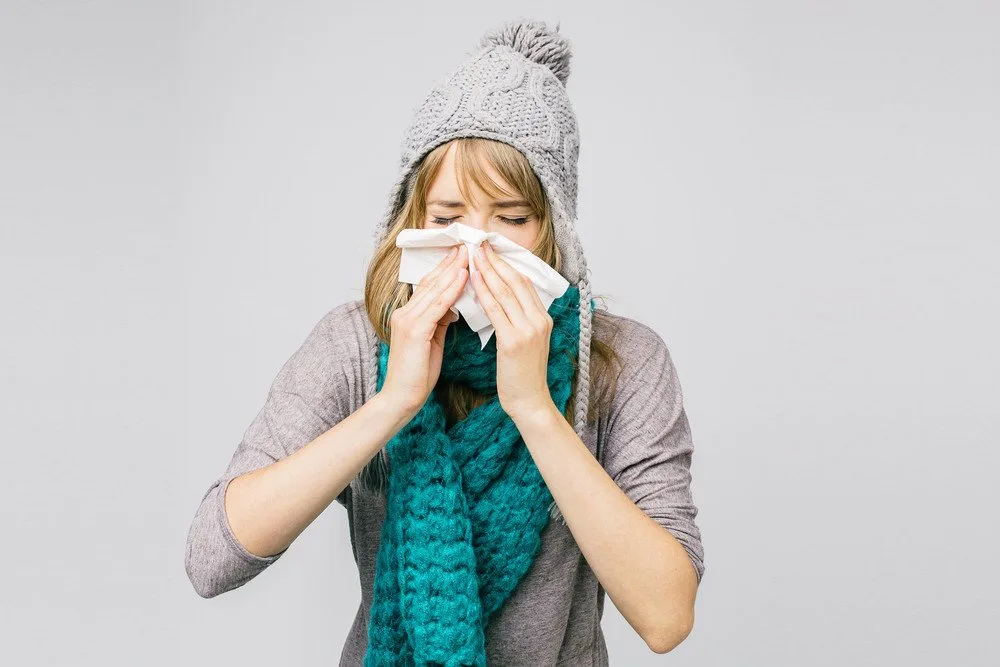Your immune system is hard at work year-round. However, with new outbreaks of colds and flu, it’s time to give it some extra TLC. Here’s what you need to know to boost your immune system naturally.
It’s ready to defend you from invaders at a moment’s notice. It will also help you recover when you’ve been sick. But how much attention do you really pay to your hard-working immune system? Here we tell you how to keep it in good shape and how to power it up when you’re feeling rundown.
Your Natural Immune System
We tend to think of our immune system as a single entity, but it’s an entire system made up of organs including the liver, and blood cells and chemicals. Each day it works overtime to keep the germs and microorganisms that cause infection out of the body and to destroy the ones that do get in.
Signs that your immunity is below par
Have you been getting more colds than usual and having trouble shaking off the symptoms? This could mean that your immune system is run down.
Other signs include:
- Wounds that are slow to heal
- You have recurring urinary tract infections
- Low energy
- Mouth ulcers
- Skin infections such as fungal infections that don’t heal well
What’s up with your immune system?
If you’ve been unwell or burning the candle at both ends, your immunity can take a beating. Sometimes though there are other factors at work.

Your gut needs some attention
About 70 percent of your immune system is located in your digestive tract. Probiotics are friendly bacteria that are thought to stimulate the immune system within the colon, possibly by destroying harmful bacteria and promoting the growth of more of the good guys. Fermented foods are loaded with probiotics and have been consumed for their health benefits for thousands of years. Try natural yogurt, kefir, kimchi, miso and sauerkraut or you can buy probiotics in supplement form. They work best when combined with prebiotics – special nutrients found in foods like legumes, wheat, oats, onions, bananas, honey, garlic, and leeks, which can help enhance the growth of beneficial bacteria. Some probiotic supplements include prebiotics.
You might be deficient in certain nutrients
Most of us find it hard to stick to a perfect diet year-round and even those who do may find themselves deficient on some level, thanks to environmental toxins and poor soil quality. Certain nutrients in particular, such as zinc and vitamin D, are essential for a well-functioning immune system.
You’re often stressed
Stress can depress our immune system, which is why there is a strong connection between many modern-day diseases and chronic stress.
Did you know?
Each part of the immune system has a unique role, from first-line defenders (white blood cells) to memory keepers (lymphocytes).
Take a closer look

To function well, the immune system needs the body to be balanced. When you’re taking good care of yourself, your immune system can do its job well. If your lifestyle leaves a lot to be desired – think of one too many takeaways and glasses of red while you work your way through Netflix – then your immune function may need a helping hand. When not functioning at its peak, the immune system becomes underactive, leaving us more vulnerable to infection.
Love your liver
When it comes to strong immunity, your liver is your best friend. It works hard around the clock, creating immune system factors that mount a rapid response against infection. Neglect this important organ and you’ll notice the effects of a weak immune system in no time. In fact, traditional Chinese medicine practitioners have such enormous respect for the liver that they believe keeping this organ happy is the key to good health.
Give your liver the level of care it deserves, and it will thank you for keeping you well and looking after you when you’re sick. Stress it out once too often with a diet of processed food, too much alcohol and hectic life and you lose your best defender.
Three key pointers
- Eat: A diet that is low in sugar and based on healthy fats like olive oil and avocado, eggs, a little meat and fish, and whole foods like fruits and vegetables – preferably organic – is best for your general health and will support your liver too. Eating plenty of fruits and vegetables to increase the number of antioxidants and fiber in your daily diet will also help repair existing damage to the liver.
- Visit: If you think your liver needs some extra support, visit a traditional Chinese medicine (TCM) clinic. According to TCM, the liver is the organ responsible for the smooth flow of emotions as well as qi (energy) and blood and is thought to be the organ most affected by excess stress. A TCM practitioner may treat the liver with diet, herbs and acupuncture to help improve its function. to find a qualified practitioner.
- Avoid: Heavy drinking, processed foods, chemicals, sugary drinks and snacks, and refined grains are best avoided if you want to keep your liver functioning well.=

Liver boosting remedies
Here are some great liver boosting remedies:
1 Turmeric
The powerful anti-inflammatory and antioxidant properties of the popular curry spice may have the potential to reduce the amount of free radical damage in your liver.
2. Milk Thistle
Milk thistle contains antiviral and anti-inflammatory compounds and is a rich source of the antioxidant silymarin, which can work to boost levels of the super-antioxidant glutathione in the liver.
3. Dandelion
Dandelion root helps maintain the proper flow of bile. As the role of the liver is to produce bile, dandelion has a direct effect on liver function. You can find dandelion tea in health food stores and some supermarkets.
Wash Up
The flu virus (and others) can live on soft surfaces, like cloth, for up to 12 hours, but for up to two days on hard surfaces like plastic. Washing your hands regularly will reduce your risk of infection. If soap and water are not available, an alcohol-based hand sanitizer will do the trick. Keep one in your bag.
How to be sniffle-proof
Just because you occasionally get sick with coughs, colds, and flu, that doesn’t mean your immune system is under par. In fact, each time you get sick and recover, it means that it’s doing a great job.
Colds and flu
Cold and flu symptoms make you feel miserable – but they are an important part of the body’s natural healing process and are a sign that your immune system is at work. Some people seem to be more susceptible to falling prey to viruses while others sail through the cold and flu season unscathed, thanks to their strong immunity. Doing things like avoiding crowds and washing your hands regularly will reduce your chances of getting sick, but strengthening your immunity will help keep viruses at bay and make for a speedy recovery if you do get sick.
Help your immune system work for you
When you are in the throes of a cold or flu, there are a few things you can do to speed up your recovery.
- Stay warm: The lower the temperature, the lower the immune response to viruses.
- Sleep more: Sleeping less than six hours a night can reduce your immune function.
- Dose up: Deficiencies may leave you open to picking up more lurgies. Make sure you have a blood test before the cold and flu season starts to check for any deficiencies and take the appropriate supplement to boost your levels.
- Keep your weight in check: The immune system works by remembering viruses it’s fought in the past and attacking them the next time they make an appearance. But experts warn that being overweight interferes with this response, which means your body forgets how to fight off things like flu if you gain weight.
- Color your plate: Brightly colored fruits and vegetables are a super immune-booster. They’re loaded with vitamin C and antioxidant plant chemicals.

Be Nutrient Rich
Filling your plate with a wide variety of nutrient-rich whole foods ensures you’re getting a balanced mix of vitamins and minerals, which will go a long way to keeping your immune system running strong. But with all the environmental toxins our bodies have to deal with every day, processed and fast foods and our busy lifestyles, we can support our immune system by incorporating specific foods into our daily diet.
Make sure you include these 9 immune-boosting power foods
9 IMMUNE-BOOSTING POWER FOODS
1 FATTY FISH like tuna, mackerel, salmon, beef liver and egg yolks are good food sources of vitamin D.
2 VITAMIN C is a water-soluble vitamin, so it’s not stored in the body and we have to eat it every day to keep levels topped up. Eat plenty of citrus fruits, strawberries, capsicum, spinach, and kale.
3 GARLIC: Studies have shown that regularly eating garlic reduces the risk of getting sick. Garlic can also work to reduce the severity of symptoms and the duration of the illness.
4 TEA: Both green and black teas are packed with antioxidant flavonoids, a type of antioxidant. But green tea contains plenty of epigallocatechin gallate, or EGCG, another powerful antioxidant that has been shown to boost immune function.
5 PAW PAW: Also called papaya, this fruit is a rich source of immune-boosting vitamin C, but it also contains a digestive enzyme called papain, which has anti-inflammatory action.
6 KIWI FRUIT: Small but mighty, these fruits are a rich source of vitamin C, folate, stand for potassium, and minutes before vitamin K – all of which give your immune system an all-round boost.
7 MUSHROOMS: Eat a cooked shiitake mushroom every day for four weeks and you’ll have a stronger immune system, according to a University of Florida study.
8 NUTS AND SEEDS: Almonds and sunflower seeds are good sources of vitamin E, an important nutrient for maintaining the immune system, especially as we age.
9 MEAT LOVERS: Beef, lamb and calf’s liver are excellent sources of zinc for carnivores.
Super boosters
Supplements can be an important part of your immune-boosting toolkit.

Even with the best intentions, it can be difficult to stick to a healthy diet 100 percent of the time – and it’s easy to fall back on too many takeaways. Late nights, colds and flu, and too much stress can leave us feeling rundown and in need of a helping hand. If you’re struggling to recover from an illness, it might be time for a visit to your GP or naturopath to check your levels.
Vitamin C
It’s one of the biggest immune system boosters of all. Want to give yourself extra protection? Consider taking a supplement in the lead up to the cold and flu season.
Vitamin D
Ask your GP for a blood test to determine if you’re deficient. Safe sun exposure is the best natural source of vitamin D, but your doctor may recommend a supplement to top up your levels.
Zinc
When it comes to having a strong immune system, zinc is number one. If you’ve been more susceptible to colds and flu lately, zinc deficiency could be to blame. Note, though, that if you take a zinc supplement and you’re already supplementing it with iron, avoid taking them at the same time because they compete for absorption.
TIP Taking zinc supplements at the first sign of a cold may reduce its severity.
Vitamin E
This antioxidant vitamin doesn’t get much mention, but as we age we need more of it to help protect our immune cells. Vitamin E also supports healthy skin, one of our immune system’s first-line defenses.
Selenium
We need this antioxidant mineral to stay healthy – but only a very small amount of it. Your doctor or naturopath may recommend a short course of selenium if you’ve been sick because even a modest boost helps kickstart the immune response.
Show some skin
Experts recommend exposing yourself a little more to a simple way to up your vitamin D. For every 10 percent decrease in clothing cover, your vitamin D level goes up by 2.Ing/ml. Just roll up your sleeves when you’re out and about and you’ll get the boost. If the UV index is 3 or higher (check at myuv.com.au) you should use sunscreen to protect your skin, says Cancer Council Australia.

GPs with a difference
Doctors who incorporate complementary approaches into mainstream healthcare are called integrative health practitioners. More people are turning to integrative health as it offers the best of both worlds by joining conventional and complementary approaches. These GPs have additional training and qualifications to equip them with the skills needed to understand elements of nutrition, Chinese herbs, and other researched therapies.
Lifestyle lessons
There are some bad habits that can really undermine our immunity. We don’t always take the best care of ourselves – skipping out on sleep, indulging in junk food, letting stress get the better of us. But over time, all of this can weaken our body’s immune response as it goes into overdrive to save us from self-inflicted damage. Healthy living is the best way to enhance your immune system. So if you’re aware that your lifestyle could do with some tweaking (and let’s face it, that’s most of us), that’s a good place to start to keep your immune system firing on all cylinders.
Sleep Well
Getting plenty of quality sleep – that’s seven to nine hours every night for most people – is vital as sleep deprivation can impact immunity, with studies showing that a lack of sleep leaves you more vulnerable to viruses and slower to recover when you’re fighting off an infection. Sleep deprivation can also increase your risk of obesity, diabetes, heart disease, and high blood pressure.
Quit Smoking

Smoking harms pretty much every organ in the body. Cigarette smoke contains high levels of tar and other chemicals, which make your immune system less effective. When you smoke, the number of white blood cells (the cells that defend your body from infections) remains elevated. This is a sign that your body is under stress – constantly fighting against the inflammation and damage caused by tobacco. The minute you quit, your body starts healing and rebuilding its defenses. Lighting up and puffing away on cigarettes and other tobacco products damage the blood vessels and decrease blood circulation. Wounds heal more slowly. Smokers tend to get sick more often than those who stay clear of smoke. Smoking also harms some of the body’s natural barriers to infection, especially the tissues of your mouth and throat.
Cut back on drinking
Drink too much alcohol, and your immune system gets drunk right along with the rest of you. A session of binge drinking slows down special immune cells called cytokines that usually act as messengers to tell the body when to mount a defense against infection. Chronic abuse of alcohol wreaks its own havoc on immunity, putting alcoholics at increased risk of some cancers, bacterial infections such as pneumonia and other diseases.
Age of Immunity
As we age, our natural immune response gradually reduces, so sticking to healthy lifestyle strategies and making sure your body is getting plenty of the nutrients it needs to work efficiently becomes even more important. It’s never too late to start looking after yourself.
Did you know?
Smoking can also lower the levels of protective antioxidants – like vitamin C – in the blood.
Sweet Truth
Sweet treats can affect certain immune cells called neutrophils, reducing their ability to protect your immune system. During the cold and flu season, this may be enough time for you to be infected. Neutrophils go right to the source of the infection to gobble up pathogens, but with sugar in your system, these immune cells quickly lose their power – and might not get back to work defending your body for another five hours. Keep this in mind next time you’re tempted to indulge your sweet tooth – especially during cold and flu season.
 Mind-Body Connection
Mind-Body Connection
Want to cut your chances of premature death by 50 percent? Then try looking on the bright side more often because research suggests that positive thinking can make our immune system work better and help us live longer. Here are some other factors that influence your immunity.
Bend and Stretch
Yoga’s ability to lower stress hormones also has a knock-on effect on your immunity. Inversion poses, in particular, stimulate your lymphatic system and help move immune cells through your body. Yoga also stimulates your body’s main systems, from your circulation to your digestion. It’s no wonder studies have linked it with improved immunity.
The effects of stress
Studies have shown chronic stress affects the immune system. It’s important to do what you can to manage it well. Persistently high levels of the stress hormone cortisol can reduce the body’s immune response.
What to do: You can’t underestimate the power of meditation. Mindfulness meditation is particularly good, with recent studies showing that it can power up immune system activity. Try The Mindfulness App, available free from Google Play and the App Store.

Rest Up
Give your immune system some quiet time to do its work. Ever wonder why doctors always advise rest, rest, and more rest when you’re sick. It’s because immunity and sleep are linked. That’s why when you’re sick you tend to doze off as your body instinctively encourages sleep to aid recovery.
What to do: If you’ve been having trouble sleeping, visit the Sleep Foundation for tips on how to set the scene for better sleep.
Have a massage
Massage doesn’t only feel good, it can also stimulate changes in the immune system. Research results showed that study volunteers experienced an increase in blood cells and lymphocytes, which play a role in defending the body from disease. As a bonus, massage also causes a significant drop in the stress hormone cortisol, which can deplete the immune system when it’s persistently high.
Book a regular massage into your busy schedule – try for at least once a month. Find a trained massage therapist with Massage & Myotherapy Australia
Get moving
Your risk of catching a cold drops by 50 percent when you’re fit, and if you do get infected, your symptoms will be 41 percent less severe. How exercise works its magic on the immune system remains unclear but researchers believe sweating may help flush out pathogens through the skin and airways and spikes in body temperature during a workout may act like a fever, which is the body’s way of fighting infection.
What should I do?
Immunity improves slowly over time so regular workouts are needed for the immune-strengthening effect. But don’t go overboard because very intense workouts have the opposite effect.
Bottom Line
If you look after your natural immune system, it will look after you. Boosting your immunity is the best way to ensure you manage viruses and infections and achieve better longevity.
References and acknowledgments
The information in this health book has come from a variety of sources including Australian Acupuncture & Chinese Medicine Association, The Australian Naturopathic Practitioners Association, Better Health Channel, Healthline.
General Note
This is intended as a general introduction to the topic. Thus, in no way should it be seen as a substitute for your own doctor’s or health professional’s advice. All care is taken to ensure that the information contained here is free from error and/or omissions, however, no responsibility can be accepted by the publisher, author, editor or any person involved in the preparation of the material for loss occasioned to any person acting or refraining from action as a result of the published information. Before commencing any health treatment, you should always consult your doctor.
About the Author:
 Debbie Duncan is an experienced writer (and sub-editor). Her work appears each month in Good Health magazine. Debbie’s qualification in nutrition and 20 years’ experience working on health magazines ensure she presents health advice in an accurate, accessible and practical way. This guide was syndicated by BAUERSYNDICATION.COM.AU/
Debbie Duncan is an experienced writer (and sub-editor). Her work appears each month in Good Health magazine. Debbie’s qualification in nutrition and 20 years’ experience working on health magazines ensure she presents health advice in an accurate, accessible and practical way. This guide was syndicated by BAUERSYNDICATION.COM.AU/




 Mind-Body Connection
Mind-Body Connection![women [longevity live]](https://longevitylive.com/wp-content/uploads/2020/01/photo-of-women-walking-down-the-street-1116984-100x100.jpg)










